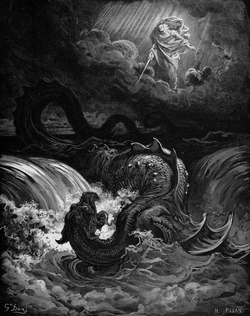This Vast Leviathan, Whose Breathing blows
Huge floods and sholes of fishes through his nose.
He, whose fair consort in salt Pickle lyes,
To feast the Jews, or else their Talmud lies.
Even he, who treated Jonas in his Belly
-With wholesome Chlius and Provoking Gelley.
-With poynant sauce and Unctious Caveare,
A Diet as restorative, and rare!
Even he, the Chief of all the Sons of Pride,
Cannot pursue his prey without a guide.
The little Musculus doth Swim before
Least he in shelves or sands, his bulk should Moor.
And of the Whales abundance, she but lives.
The Emperious Monster escapes, and Mamucks gives
So May you see Nils Caymen, gaping, lye.
Whilst in and out his Mouth, the wren doth flie,
To make him, when the ichneumon, her foe,
Into her Loathed Intralls strives to go,
for which the Putred flesh she picks away
Between her teeth, this being all her pay.
So greatest Monarchs poorest vassals need:
So hungry Peasants pampered nobles feed.
Then, let those that are placed the rest above
Answer their labour with care and Love.
And Pity those which labor at the Plough,
‘Tis God that made the difference, and not thou.
Creatures of Pulter
Matthew Cook, Jesse Rabner
The Leviathan is a creature in Jewish religion, said to be the strongest and highest of all beasts. It is the “son of pride” and undestroyable. The Bible prophecies that in the end times, the angel Gabriel anointed with the almighty power of the lord, will slay this great sea monster. The Leviathan is kocure being an animal of fins, and so it will be served to the Jewish people, the “righteous”, however only a being ordained by christ may strike it down, any man or woman would undoubtedly perish in a futile duel. The following is a depicition of the final battle between Gabriel and The Leviathan.
Leviathan in Judaism
These ancient accounts within the Talmud, annotated by Revd. Mr. J.P. Stehelin of the Leviathan help us to understand many of the essential characteristics of the biblical beast that Pulter references. Qualities such as its truly immense size as well as the prophecy of it being feasted upon by the Jewish people serve as a contextual backbone in Pulter’s poem “Leviathan”. The downfall of this esteemed sea creature within the poem is symbolic of a theoretical deterioration of the English monarchy in addition the inter relations of each social class in regards to the hierarchy of the feudal system. Pulter’s decision to use the Leviathan as an emblem to represent the 17th century English monarchy is her intricate way of making political commentary.
Rabinical literature: or, The traditions of the Jews, contained in their Talmud By the Revd. Mr. J. P. Stehelin.
Pages 94-95
Twelve Months after, we came there again, we
saw, that they had sawed the Bones of the Fish, for
rebuilding the Cities, which had been demolish’d
by Means of it. Soon after this Account,
comes the following; “Rabba, Grandson to Chan-
na, hath said, We went once into a Ship, and
beheld a Fish, on the Back of which there lay
Sand; and Reeds did grow upon it, (that is, upon
the Sand for the Honour of the Rabbinical Philolo-
sophy). We took it to be firm Land, and got upon
it, and boiled and roasted upon the Fish: But when
the Fire began to penétrate him, he turn’d him-
self and if the Ship had not been near us, we
should all have been drown’d. …..
Another Account of a Fish in
the same Treatise, is the following. Rabbi fo-
chanan relates, We went once in a Ship, and beheld
a Fish which put its Head out of the Sea. Its eyes were like two Moons;
and the water spouted out of his Nostrils, like two rivers of Sura.”
Soon after comes the following Passage: “ The Raf Safra , relates,
We once went in a Ship, and saw a Fish,
which put his Head out of the Sea,
and which had Horns, and upon them was writ
ten, I am one of the meanest Creatures which in-
habit the Sea, and am Three Hundred Miles in
J.P. Stehelin, “Rabinical Literature: or, The traditions of the Jews, contained in their Talmud” (1748) https://catalog.hathitrust.org/Record/007698139/Cite The Destruction of Leviathan by Gustave Doré (1865) https://en.wikipedia.org/wiki/Leviathan

